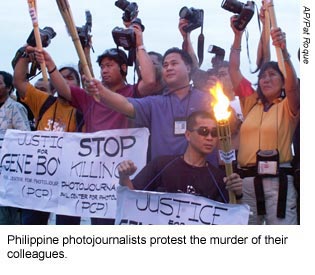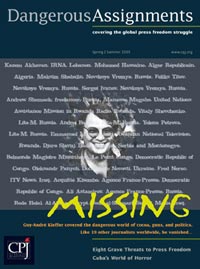|
CPJ Update
May 16, 2005 News from the Committee to Protect Journalists |
 Most murderous places Most murderous placesPhilippine officials called for the government to put an end to a deadly, years-long assault on journalists after the Philippines topped our list of the world’s “Most Murderous Countries for Journalists.” President Gloria Macapagal-Arroyo launched a press freedom fund to assist victims’ families and stop attacks against journalists. We issued a special report identifying the world’s most murderous countries and analyzing deaths among journalists to mark World Press Freedom Day on May 3. Eighteen Philippine journalists were killed in retaliation for their work since 2000. Iraq, Colombia, Bangladesh, and Russia rounded out our list of the five most murderous countries for journalists. Our analysis, which continues to draw worldwide media attention, revealed that murder is the leading cause of job-related deaths among journalists worldwide, and that murder with impunity is the most urgent threat to journalists worldwide. The report also noted that journalists were often slain in retaliation for reporting on government corruption, crime, drug trafficking, or the activities of rebel groups Deadly violence against journalists continues unabated in the Philippines. Klein Cantoneros, a radio broadcaster known for his anti-corruption stance, was shot dead by gunmen on May 4. Less than a week later, Philip Agustin, editor and publisher of the local weekly Starline Times Recorder, was also shot and killed. A CPJ delegation will travel to the Philippines this summer to further investigate the killings and push for government action. To read about the Most Murderous Countries for Journalists: http://www.cpj.org/Briefings/2005/murderous_05/murderous_05.html To read about the most recent Philippine slayings: Dangerous checkpoints in Iraq Our research shows that U.S. forces’ fire in Iraq has taken the lives of at least nine journalists and two media workers since March 2003. Journalists have told CPJ that the protocol in approaching U.S. checkpoints remains unclear two years after hostilities began. Several have described coming under fire unexpectedly when approaching checkpoints or when operating in their vicinity. We urged the Pentagon to follow through on the recommendations contained in its April 30 investigative report. The recommendations include: a review of checkpoint and roadblock procedures; the use of more effective warning signs; the use of speed bumps and other roadway alerts; and the launch of a public awareness campaign to alert drivers how to respond at checkpoints. To read more: http://www.cpj.org/news/2005/Iraq02may05na.html CPJ security handbook now in Arabic The translated version, funded by a grant from CNN, was published in response to the heavy toll suffered by Arab journalists covering the Iraqi conflict. Since the war began, 41 journalists of various nationalities have been killed in the line of duty, but Arab journalists have suffered the most casualties, with 26 killed, mostly in crossfire. CPJ Journalist Security Coordinator Frank Smyth, the handbook’s author, will release the new edition at a Doha press conference. New board members Censorship in the Arab world Development news |
 Dangerous Assignments coming soon
Dangerous Assignments coming soon